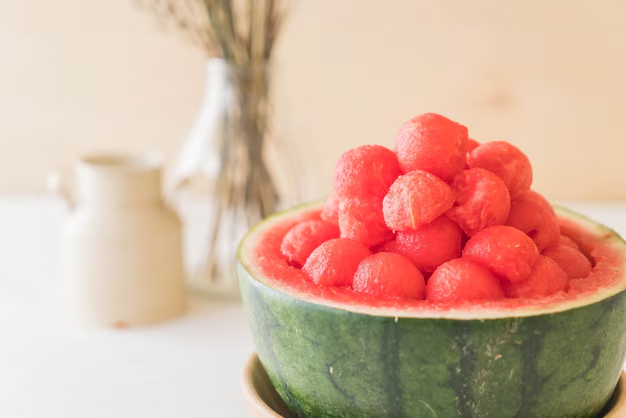Your Guide to Is Watermelon Bad For Diabetes
What You Get:
Free Guide
Free, helpful information about Diabetes FAQ and related Is Watermelon Bad For Diabetes topics.
Helpful Information
Get clear and easy-to-understand details about Is Watermelon Bad For Diabetes topics and resources.
Personalized Offers
Answer a few optional questions to receive offers or information related to Diabetes FAQ. The survey is optional and not required to access your free guide.
Can People with Diabetes Enjoy Watermelon?
When you think of summer, you probably imagine a refreshing slice of watermelon on a hot day. It's sweet, hydrating, and undeniably delicious. But if you're managing diabetes, you might wonder if this juicy fruit aligns with your dietary needs. So, is watermelon bad for diabetes? The answer isn't a straightforward yes or no; it’s about understanding how watermelon fits into your overall dietary plan.
Understanding the Glycemic Index and Carbohydrates
The key to determining watermelon’s suitability lies in its glycemic index (GI) and carbohydrate content. The glycemic index measures how quickly foods raise blood sugar levels on a scale from 0 to 100. Watermelon has a high GI rating at around 72. This might suggest that it’s not the best choice for blood sugar control. However, it’s crucial to dig deeper: the glycemic load (GL), which considers both the GI and the amount of carbohydrates in a typical serving, tells a more complete story.
Watermelon is mostly water and has a relatively low carbohydrate count in one serving (about 11 grams in a cup of diced watermelon). Its glycemic load is low (about 5 on a 0-20 scale). This means that while watermelon can cause a quick rise in blood glucose levels, the effect is relatively mild if consumed in moderation.
Nutritional Benefits of Watermelon
Besides its carbohydrate profile, watermelon is packed with nutrients that can be part of a well-rounded diet. It contains:
- Vitamins A and C, which are vital for immune function and skin health.
- Potassium, an essential mineral for blood pressure regulation.
- Lycopene, a powerful antioxidant known for its role in heart health and cancer prevention.
These nutritional benefits can support overall well-being, which is particularly beneficial for those managing diabetes, given their higher risk for heart-related issues.
Mindful Consumption is Key
For those with diabetes, moderation is your best friend. Consider these tips when incorporating watermelon into your diet:
- Pair with Protein or Fat: Eating watermelon alongside a handful of almonds or a slice of cheese can slow digestion and minimize blood sugar spikes.
- Portion Control: Stick to a small serving size, like a one-cup serving, which allows you to enjoy its sweetness without overwhelming your system.
- Monitor Blood Sugar Levels: Keep an eye on how your body responds to watermelon by checking your levels after eating.
Beyond Diet: Financial and Educational Support
Managing diabetes often extends beyond dietary adjustments to lifestyle and financial planning. Navigating medical costs, acquiring prescription supplies, and accessing educational resources can be challenging. Thankfully, there are numerous programs designed to ease the financial burden and provide the necessary support:
- Medicare and Medicaid: These government aid programs help cover costs for medical supplies and diabetes management tools.
- Prescription Assistance Programs: Many manufacturers offer programs to help reduce the cost of medications.
- Debt Relief Options: Financial counseling can help restructure debt, making medical expenses more manageable.
- Diabetes Education Classes: Available through hospitals and community centers, these classes offer valuable information for managing diabetes.
Incorporating watermelon into a diabetic-friendly diet requires consideration and planning, but it is entirely possible to enjoy this summer favorite without derailing your health goals. Alongside managing your diet, remember to explore supportive resources that can assist you in navigating the financial and educational aspects of diabetes care.
Financial Assistance Resources:
- 💊 Medicare & Medicaid: Assistance with medical costs related to diabetes.
- 💉 Prescription Assistance Programs: Manufacturer programs for lowering medication expenses.
- 💰 Debt Counseling Services: Help with restructuring debt to manage healthcare costs.
- 📚 Educational Grants for Diabetes Management Classes: Local community classes offering management strategies.
What You Get:
Free Diabetes FAQ Guide
Free, helpful information about Is Watermelon Bad For Diabetes and related resources.

Helpful Information
Get clear, easy-to-understand details about Is Watermelon Bad For Diabetes topics.

Optional Personalized Offers
Answer a few optional questions to see offers or information related to Diabetes FAQ. Participation is not required to get your free guide.


